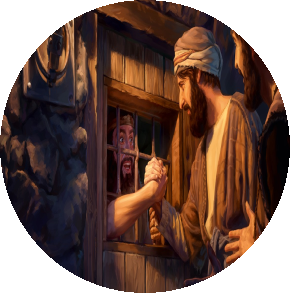Compassion and Understanding

John the Baptist sat in Herod’s prison. Knowing that his life hung by a very thin thread, he sent two of his disciples to Jesus to ask, “Art thou he that art to come; or look we for another? ” (Luke 7:20). What had happened to the mighty, fearless preacher who called his whole nation to repentance and accused the Pharisees of being a brood of vipers?
John was born to elderly parents—an incredible miracle. Growing up, he must have heard them say countless times, “You are the one the prophet Isaiah wrote about, the one who will come in the spirit of Elijah to prepare the way of the Lord.” John had absolutely no doubt about his identity, and he knew how to answer those who asked if he was the Messiah. “I am not the Christ,” he confessed. “I am the voice of one crying out in the wilderness . . . . It is he that shall come after me.” (John 1:20, 23, 27).
Shortly afterward, John publicly declared Jesus to be the Son of God and Israel’s Messiah, proclaiming, “Behold the Lamb of God, behold him who taketh away the sin of the world.” (John 1:29). This declaration testifies of the deep knowledge, revelation, conviction and understanding John had about God’s purpose.
How did Jesus respond to John’s confusion?
In prison, however, he wondered whether or not he had made a fatal mistake. John the Baptist—of whom Jesus testified that he was the greatest man born on earth—went through the worst confusion and doubt anyone can entertain: He questioned whether he’d failed his mission and misled his nation by declaring the wrong person to be the Messiah.
The reason for his confusion was that he expected Jesus to use His power to rescue him and set up His kingdom.
Amazingly, Jesus didn’t condemn him. Neither did He say to John’s disciples, “You mean John sent you to ask Me these questions? It shows that he has lost it completely. I never thought he would fall by the wayside like anyone else.”
Instead, Jesus responded with understanding and compassion.
First, He healed many who were sick, blind and lame, and He delivered those afflicted with evil spirits.
Then He told John’s disciples, “Go and relate to John what you have heard and seen: the blind see, the lame walk, the lepers are made clean, the deaf hear, the dead rise again, to the poor the gospel is preached:” (Luke 7:22-23).
What Jesus was saying to John was this: “John, it’s all right. You are expecting action. You wanted Me to snap my fingers and get you out of prison and vindicate you. You are a righteous and wonderful individual, but that’s not what I am going to do.
“When you serve Me, you will go through times of deep struggles. But if you keep looking at what I, the Lord, am doing, you will see that you have a part in all of it.
“John, don’t forget that these blind people now see, the crippled walk and millions who were lost are turning to the Father. John, it’s worth it.”
Let us learn from Jesus!
The next time we see our brothers and sisters discouraged and confused, let us not say with our mouth, “I will pray for you,” while in our heart we are saying, “You idiot, don’t you know better?”
Instead, let us encourage them to keep looking at what Jesus is doing and see the difference that their lives are making. A kind word means so much.
And one more thing: When Jesus talked to the crowds about John, He never mentioned John’s doubt and confusion. Instead, Jesus made the most amazing statements about John’s life and ministry.
Can we do the same for fellow believers in Christ? Let us be willing to look past their problems and times of discouragement and see the amazing things God has done in and through their lives. Take time to consider the good God has done through others’ lives. And then let us believe that He will do even greater things through them in the future. Today is not the final snap shot of their story.




 Follow
Follow


